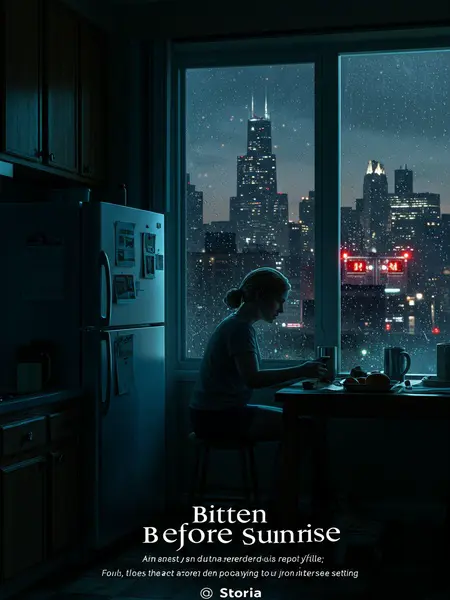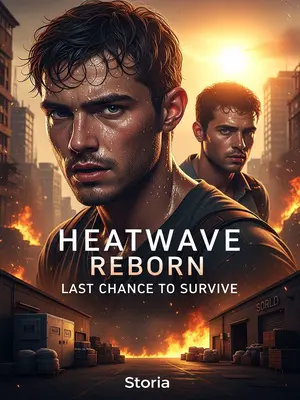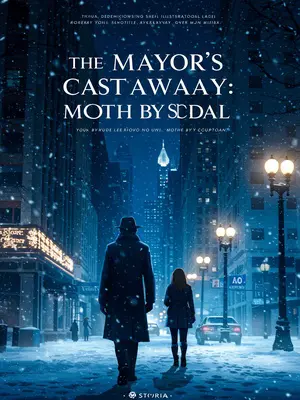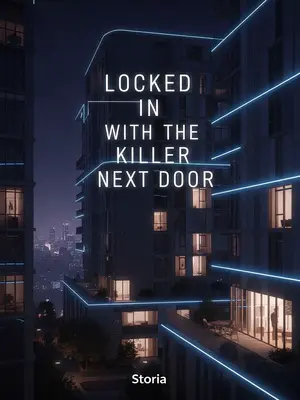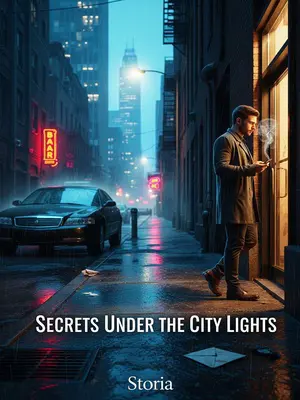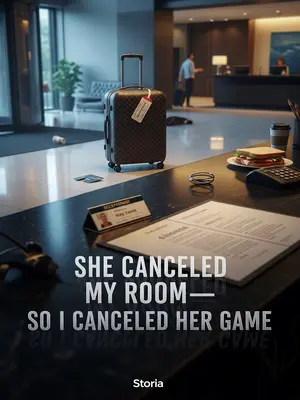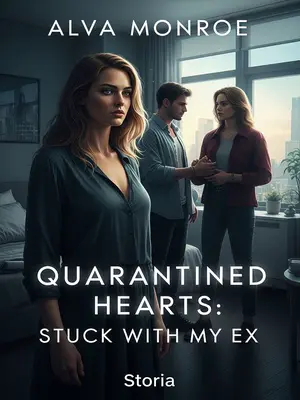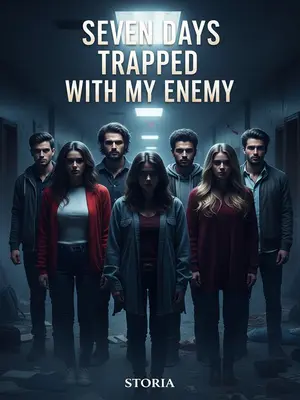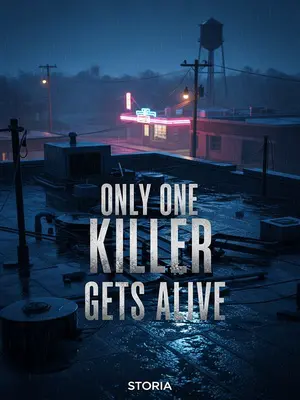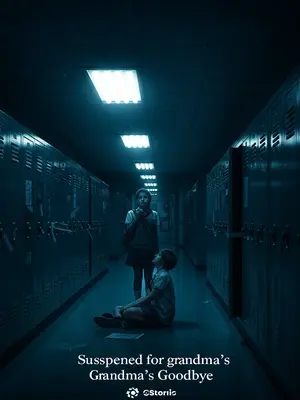Chapter 1: Running from the Dead
If you’d told me last week I’d be running from zombies, I’d have laughed you out of the bar.
Now, looking back, it’s still wild—like something straight out of a late-night Syfy marathon. But in those first moments, nothing felt cinematic. There was this electric static in the air, the kind you get on a summer morning when you know something’s off but can’t say why.
The first real sign came when a rental agent I’d friended on Facebook posted a video.
I’d only added him because he seemed like the kind of guy who knew everyone—always sharing memes, posting about his dog chasing squirrels. But this morning, his feed was dead serious.
The video showed a long police line outside St. Gabriel’s Hospital, right next to the Maple Heights subway station. I recognized the Dunkin’ Donuts on the corner, the mural of jazz legends—now splashed in blue and red from the cop lights.
It was surreal to see the street I walked every day taped off, squad cars everywhere, blue and red lights flickering off the wet pavement. In the video, the low hum of engines mixed with the distant honk of cabs looping the block.
When I opened the video, the agent’s thick Jersey accent blared: “Yo, something’s going down at St. Gabriel’s—cops all over, dudes in those freaky hazmat getups. This ain’t normal.”
He sounded half annoyed, half spooked—like he couldn’t decide if this was a prank or a chemical spill. Underneath his wisecracks, I could hear the edge of real anxiety.
I commented: “There’s a confirmed case.”
My heart thudded after I hit send, jittery like caffeine on an empty stomach. But when I refreshed, the post was gone—like the city itself had swallowed it. The hairs on my neck prickled.
My thumb hovered over the refresh button, but the post had vanished. I scrolled, hoping maybe it got buried, but nothing. The agent must’ve noticed too, because my phone buzzed immediately.
He sent a voice message. As soon as I put on my headphones, a second message came through right after.
His voice crackled with static, like he was dodging traffic: “Ma’am, I was just about to reply, and suddenly my post disappeared. But I didn’t delete it.”
There was a muffled sound in the background, someone yelling far off. The city’s usual soundtrack, but twisted with tension.
“Not sure if it’s a confirmed case, but there are SWAT teams. Looks pretty freaky. Your lease is about to expire, you gonna renew?”
Only a Jersey real estate guy would segue from apocalypse to business. But honestly, the question hit me like a cold slap—I hadn’t decided about my lease yet.
My Maple Heights apartment was well laid out, had good stores nearby, and was cheap, but there were just too many people. The subway at 8 a.m. every day wore me out, both physically and mentally.
I’d grown up in Willow Creek, where rush hour meant getting stuck behind a tractor. Every morning in Chicago, I felt like I was playing human Tetris just to get to work. Some days, the city’s energy felt like a drug; other days, like I’d aged a decade just from standing in line at Starbucks.
But moving meant more hassle: finding a new place, hauling my stuff, paying deposits and three months’ rent upfront. Just the thought of wrestling boxes up another walk-up or shoving a mattress through a door at midnight made me want to scream.
While I hesitated, the agent sent another voice message—almost a minute long. My head throbbed just seeing the length, but I clicked anyway. Couldn’t help myself.
The first half was the usual: him griping about how hard it is to rent apartments now that all the college grads are leaving, urging me to renew fast for a discount.
He always acted like he was doing me a favor, slipping in: “I can getcha a real sweet deal, but only if you sign by Friday, okay?” If it weren’t for his accent, he could pass for any hustling Chicago landlord.
But the second half? Something changed.
The background got noisy. Without warning, a muffled scream tore through the recording.
Agent: “What the hell!” Then he muttered, “What is that?” Then came a lot of static, chaotic noise, impossible to make out, and finally—a deafening bang.
My headphones weren’t even turned up, but that last bang made my ears ache.
It sounded like someone slammed a metal dumpster right next to the phone’s mic. I pulled my headphones off and just stared at my screen, pulse jumping, my mouth dry, the metallic taste of fear coating my tongue.
I squeezed through the subway crowd to the window, trying to look toward the hospital, but the train was already at the next station and I couldn’t see anything.
Everyone around me was locked into their screens, earbuds sealing them off. It felt like I was the only one who could hear the world cracking open.
I messaged the agent: “Still need to think about it.” I never got a reply. My thumb hovered, wanting to type more—ask if he was okay. But the message bubble stayed empty, and for some reason, I just knew not to push it. The city felt suddenly dangerous.
When I got to the office, only half the usual people had come in.
Desks that were always messy were suddenly spotless, chairs turned neatly in. I tossed my bag on my own cubicle, glancing around for familiar faces.
Everyone was talking about some four-letter celebrity’s statement from yesterday. No one seemed to know about the possible case near Maple Heights.
They laughed and scrolled, sharing tweets and TikToks about the latest scandal. I tried to join in, but my mind was racing with flashes of that video, the scream, the bang. I stared at my coffee cup, hands trembling, feeling out of sync with the normalcy around me. I pressed my palm to my sternum, trying to steady my breathing.
I couldn’t help but message a coworker who also lived in Maple Heights. She replied instantly: “Seriously, get out. Don’t wait. Things are about to get ugly.”
My heart tightened, unease intensifying. Typing felt too slow, so I called her directly.
She picked up after just one ring. I could hear the airport boarding announcements in the background. Before I could say anything, she lowered her voice and spoke quickly: “The city will be locked down at 8 a.m. tomorrow. Leave if you can, and stock up on supplies as much as possible.”
The words hit me like a punch. The background noise—rolling suitcases, muffled voices, the beep of a departing flight—made it all feel too real. Then the call ended.
She sent me a video.
The video was of St. Gabriel’s Hospital, panning from the emergency entrance to a close-up inside the ER. The hospital’s sliding glass doors reflected ambulances stacked outside. A flash of fluorescent lights, then—inside—a man in a hospital gown, even while restrained by four people, broke free for a moment and, in that instant, bit a huge chunk out of one person’s arm—blood spurted everywhere.
The ER erupted into chaos—people screaming, security guards tackling the man. My own breath caught as I watched the gore splash the floor. This wasn’t a movie. This was real.
Thirty seconds later, the man who’d been restrained convulsed and collapsed. The video cut off abruptly.
A terror I couldn’t describe hit me like iron fists pounding my chest. I tried to swallow, but my mouth was dry as sand. A weird buzzing filled my ears—the kind you get right before you faint.
I was never the type to believe everything I saw online. I always prided myself on being skeptical, the last person to forward a chain email or fall for a Facebook hoax. But this felt different—visceral and raw.
At that moment, a single word flashed uncontrollably through my mind. I couldn’t stop thinking it. The word rolled around my skull like a marble in a jar: zombie. I didn’t want to believe it, but my gut twisted with certainty.
I jumped up from my seat. Under the surprised gazes of my coworkers, I kept my eyes low, voice shaky, and blurted out that I had a family emergency.
My voice cracked a little, but the urgency in my eyes must have convinced them. Heads popped up above cubicle walls, eyebrows raised.
The boss was startled, probably imagining something, and hurriedly told me to go home, even giving me a week off. His voice was so kind, so uncharacteristically gentle, that for a second I almost laughed. I stuffed my laptop in my bag, heart thumping like a drum, and hustled for the elevator.
Pushing aside that unthinkable word in my mind, I called an Uber. While waiting, I called my dad.
My hands shook as I scrolled through my contacts, thumb hovering over his name. I barely remembered what I’d planned to say.
On the call, I told him to drive back to Willow Creek right now, and that I’d be coming home today. My voice was rushed, words tumbling over each other. I told him it was urgent, that I’d explain later.
He started with, “What’s wrong, kiddo? You sound like you just saw a ghost.” Even though it was only Monday and he works in Dayton, 250 miles from Willow Creek, as a doting father, he’d rush to the airport the moment his daughter wanted to come home.
But on the phone, he was still a bit confused by my sudden return. He kept asking, “Did something happen? Are you sick?” I tried to sound upbeat, but I could tell he was already grabbing his car keys.
The Uber was almost here. I didn’t have time to explain, so I promised to call him as soon as I got out of the car.
I watched the little sedan icon on my phone crawl closer, the city humming in the background. The sun felt too bright. I felt like a ghost passing through the lobby.
Today, the Kennedy Expressway was even more congested than usual. Even the driver kept muttering, “Hey, what’s going on?”
We inched past a White Castle, the drive-thru line wrapped around the block, horns blaring like it was game day. He flipped his radio between talk stations, each one repeating the same vague warnings about traffic backups, a police investigation, nothing specific. I clutched my backpack and stared out the window at the endless line of brake lights.
Because of that video, I was anxious, glancing back at the car several times, feeling especially unsafe.
Every time the driver hit the brakes, I startled, visions of hazmat suits and blood flashing behind my eyelids. I wished I’d never watched that video, or maybe that I’d paid more attention to the news the last few weeks.
But I knew worrying wouldn’t help. I took a few deep breaths and, with shaking hands, opened Expedia to search for direct flights to Willow Creek.
The familiar blue and white interface loaded up. I punched in the dates with fumbling fingers, praying there was still a seat.
The earliest flight was at 2:40 p.m. from O’Hare. Only one ticket left, over $300. I didn’t even blink—I booked and paid in one go.
It was the kind of expense that normally made me wince, but this time I was grateful just to have a way out. I screenshotted the confirmation, checked my wallet again.
Then I called my mom.
Last October, our family bought a new three-bedroom, two-bath house in Willow Creek. Since it was a new development, we only got the keys in April after renovations. It was supposed to be our dream home—quiet cul-de-sac, fresh paint smell, still enough space for a backyard barbecue. None of us had spent a single night there yet.
But there had been outbreaks since April, so going back meant 14 days of quarantine, and we hadn’t even seen our new home yet.
The idea of finally living there—just as the world seemed to be falling apart—felt like some weird cosmic joke.
When the call connected, before my mom could say anything, I asked for the new address and told her to leave work now, since I’d be home this afternoon.
She answered with her usual briskness, voice muffled by the sound of lab machines in the background. Behind her, I could see the break room fridge and a faded OSHA poster taped to the wall.
My mom flatly refused. She’s a very rational chemist. If I disrupted her work for no reason and couldn’t give a good explanation, she wouldn’t go along.
I could picture her, lab goggles still on, giving me that look she reserved for telemarketers and conspiracy theorists. But I wasn’t ready to give up yet.
But since I’m her daughter, when I said I’d bought a ton of groceries and wanted her to cook for me tonight—especially ribs that would spoil if I didn’t get back soon—she immediately started scolding me for wasting money, but also took leave to go home.
She grumbled about my shopping habits, but I could hear the relief in her voice. Even the toughest scientist is still a mom when it comes to their kid wanting dinner.
After hanging up, the car finally got out of the congestion and onto I-90. The highway shimmered with heat, the city skyline receding in the rearview mirror. I watched the other cars, wondering if anyone else was running for their lives, or if they were all just late for work.
There were still lots of cars on the highway, almost like rush hour. I wondered if others had heard something and, like me, were trying to escape as quickly as possible…
The unease wouldn’t go away. Every horn blast felt like a warning.
Time was tight. I opened Instacart, entered the new home address, and planned to order from the nearest supermarket.
I typed and retyped the address, cursing myself for not memorizing it sooner. The site kept timing out, probably from all the panicked shoppers.
Willow Creek is a small, out-of-the-way town, with only three big supermarkets: Walmart, Kroger, and Safeway.
I’d always thought of it as a sleepy place, the kind of town where people left their doors unlocked and store clerks knew your name. I’d never imagined having to fight for a loaf of bread there.
Each of these usually has just two locations in the whole town, and they’re in different neighborhoods.
I mentally mapped out the best routes, thinking about where the traffic would be worst if things got bad.
I wanted to order directly through the app, but found there were no large supermarkets near our new home.
My heart sank. I opened DoorDash and searched for groceries, finally finding a halfway-decent small shop.
Scrolling through, I realized I didn’t recognize half the brands. I hovered over the “Add to Cart” button for five different kinds of olive oil, wondering if any of it would matter in a week.
I rarely cook at home—always ordering takeout—so I didn’t even know what kind of oil we usually used. Only when I started adding things to my cart did I realize how expensive groceries really are.
I was stunned at the prices: $11.99 for a jug of canola oil? I’d spent less on dinner for two at the corner taqueria. Still, I kept clicking. Who knew when we’d see another delivery?
As for meat, I didn’t dare buy from the small shop. The prices were outrageous and the quality questionable. Better to wait and buy at the wholesale market with my parents.
I remembered my mom’s stories of freezer-burned pork from her childhood. No way was I trusting this store’s mystery steaks.
I stared at the $3,000 total—enough to buy a used car. But in the apocalypse, flour costs what it costs. The sum made my stomach clench, but survival was worth every penny. I hit the final “Place Order” button with a trembling thumb as the Uber driver parked at the curb.
As soon as I got out, the shop owner called.
He sounded confused, double-checking the order—“You really want this much flour and bottled water?” I reassured him, “Yes, it’s for a family thing.” He sounded skeptical, but let it go.
He double-checked with me to make sure I hadn’t ordered by mistake, then hung up, still suspicious.
I knew he’d probably be talking about this with his wife over dinner, wondering what on earth I was up to. But as long as he delivered, I didn’t care.
I looked at the order address: “Maple Heights Estates, Building 12, Unit 1, Garage B1,” and couldn’t help but praise my own cleverness.
It was a tiny bit of paranoia, but I figured it was better safe than sorry. If anyone checked, they’d see the supplies going to an empty garage, not our front door.
I knew a bulk order like this would attract the owner’s attention, so I deliberately avoided my own unit on the 16th floor of Unit 3. Better to haul supplies myself than risk exposing our plans.
I wasn’t taking chances. I’d watched enough true-crime shows to know a little misdirection never hurt.
Looking at the full list of supplies I’d ordered, I finally felt a little relieved.
At least for now, I’d done everything I could. The sense of control steadied me—if only a little.
Although I still didn’t know what we would face, I didn’t relax just because I’d escaped this afternoon. Instead, I became even more vigilant.
Every creak of the building, every unfamiliar face in the hallway, set my nerves on edge. I kept glancing out the window, watching for signs that the world was about to tilt off its axis.
What was really going on with the patient who bit people in the video?
Was it a new drug? A super-rare mental break? My brain ran in circles, trying to find a rational explanation and coming up empty.
A major city with millions of people, a transportation hub, just locking down like that?
The logistics alone were staggering. Who could make that call? What did they know that we didn’t?
Why would the country’s economic and cultural center be evacuated—was it out of control?
For the first time, the skyscrapers and packed sidewalks of Chicago felt like a trap instead of a triumph.
What on earth was happening to this world?
I sat on the edge of my bed, rubbing my temples, searching for an answer that never came.
After arriving home and entering the master bedroom I rented, I started a family video call with my parents.
The tiny camera flashed on, and for a second, their familiar faces were a lifeline—a reminder that I wasn’t completely alone in all this.
My dad answered right away, already packed and waiting for my call before leaving.
I saw his old Ohio State hoodie and the familiar stress lines around his mouth. He gave me a thumbs up, the same one he’d used since I was six.
My mom picked up after a few rings. She was washing vegetables in the kitchen, her hands still wet.
She wiped her palms on a towel, peering at the phone screen with a mixture of worry and annoyance. “What’s going on?” she asked, voice sharper than usual.
Seeing both their faces, my emotions broke down and my voice trembled so much I couldn’t speak.
I tried to say it was nothing, but my lip quivered, and a single tear slipped down my cheek before I could stop it.
I’ve never been a strong person, and the crushing truth nearly broke me.
I felt like a kid again—lost, scared, just wanting someone to tell me it was going to be okay.
I didn’t dare say anything, afraid they’d just laugh it off.
But the silence stretched, so heavy I could hear my own heart pounding in my ears.
My dad’s brows furrowed instantly: “What’s wrong, honey? What happened?”
His voice was gentle, but the old steel was there too. The kind of voice that made me believe, as a child, that dads really could fix anything.
My mom immediately turned off the tap, paused for a few seconds, then asked, “Sweetie, does this have to do with your sudden return?”
She rarely used pet names, except in moments of true worry. I nodded, swallowing the lump in my throat.
I nodded, knowing there was no time to waste. I forced down the trembling in my voice and finally spoke.
I clutched my phone with both hands, forcing myself to meet their eyes on the screen.
“I don’t know exactly what’s happened, but I know it’s serious.”
They both leaned in, waiting. I took a shaky breath.
“The city will be locked down at 8 a.m. tomorrow. Someone warned me to run and stock up on supplies.”
I watched as my mom’s face went pale and my dad’s mouth tightened. I knew how it sounded—crazy, like some conspiracy theory.
“I’m really scared. Mom, Dad, you have to believe me. We really need to buy at least a year’s worth of supplies.”
My voice cracked on the last word. I waited, terrified they’d dismiss me.
My dad said firmly, “Don’t be afraid. Your parents are your strongest support.”
He always said that when I was a kid, and I’d never needed it more than right now.
My mom tried to act calm, but her tightly knitted brows betrayed her: “If we don’t believe you, who else would we believe?”
She let out a slow exhale, then gave a small, brave smile. For the first time all day, I started to believe we’d get through this.
She took a deep breath and took off her apron. “Stock up, right? Forget about my cooking tonight, I’ll go to the wholesale market now. Send me your shopping list and I’ll see what you missed.”
Her tone was brisk—action-oriented. That’s how my mom showed her love: by getting things done.
My dad grabbed a Diet Coke from the fridge, popping the tab with a shaky hand: “Dad will buy some supplies in Dayton too. Don’t worry, our family will be fine. Don’t be afraid. Pack your things and get to the airport, don’t miss your flight.”
His confidence steadied me, and for a moment I could breathe again. I watched the familiar flick of his lighter, a grounding detail in the chaos.
Being trusted by my family, a wave of warmth flooded my heart. I quickly said, “I’ve already placed an order for supplies, but to avoid drawing attention, I had them delivered to the B1 garage of Unit 1. They’ll arrive after 8 p.m. Be careful moving them upstairs—don’t run into anyone.”
I rattled off the details, voice steadier now that I had a plan.
My mom grabbed her car keys and got ready to leave: “Alright, don’t worry. Don’t you remember every winter we used to stockpile a ton of potatoes? Relax, Mom won’t let anything happen to you.”
Her voice was lighter, almost teasing. I felt my shoulders drop for the first time all day.
I nodded, hung up, tried to calm my shaking arms and legs, and started packing my things in the rental.
My hands worked on autopilot—shirts, jeans, laptop, charging cables—while my mind replayed every warning from the past twenty-four hours. I tossed my favorite hoodie on top, the one from college. It felt like tucking a piece of my old life in with me.
There actually wasn’t much I really needed to take.
I’d learned the hard way that in a crisis, less is more. Besides, I knew Mom would have everything else covered.
Since we already had cookware and bedding at home, I only packed two big boxes of clothes, my computer, and my own medicine stock. As for food, I didn’t take any.
I stared at my little pile—just enough to fit in the trunk—and felt a weird sense of detachment, like I was leaving my old life behind.
Even though the flight was at 2:40, I left at 11.
I wasn’t taking any chances. Chicago traffic was unpredictable even on a good day.
It usually takes only half an hour from Maple Heights to the airport, but seeing the traffic today, I checked the airport expressway on Google Maps and saw it was jammed red. I quickly dragged my two suitcases to the subway.
My arms ached as I wrestled the bags down the stairs, my heart pounding in time with my footsteps. I caught the eye of a security guard at the turnstile, but he just nodded and waved me through.
